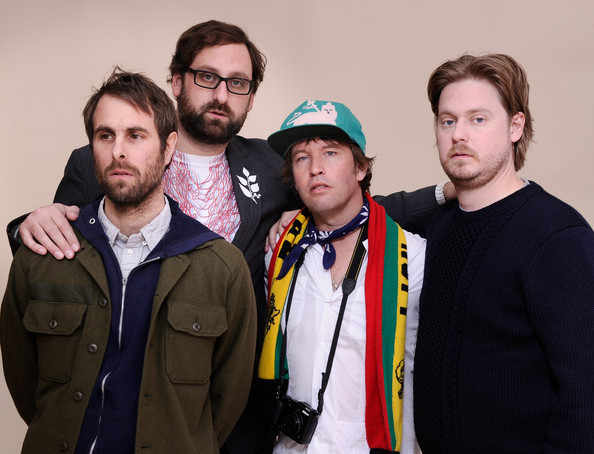Rick Alverson and the Comedy That Isn’t

ABOVE (LEFT TO RIGHT): RICK ALVERSON, ERIC WAREHEIM, JEFFREY JENSEN AND TIM HEIDECKER AT SUNDANCE, JANUARY 2012. PHOTO COURTESY OF LARRY BUSACCA/GETTY IMAGES.
The Comedy begins with a familiar Brooklyn house party: a group of drunk men in their late twenties and early thirties swilling beer in various states of undress. Tim Heidecker wears saggy, worn American Apparel underwear and dances with other, equally under-clothed men. However there are no jovial undertones to this scene, no sense of camaraderie or shared experience—rather this initial scene sets the tone for the entire film: the stunted growth of urban living, a painful depiction of isolation and cruel self-involvement in America’s in the largest city.
There are, of course, laughs involved in The Comedy—a scene with Tim, Eric [Wareheim], and their pal James Murphy in a church is down-right hysterical. Nonetheless, the film is no Tim and Eric’s Billion Dollar Movie—Tim in particular reveals a new, much more somber dimension, one filled with loathing, pain and abuse. In short, The Comedy is not a comedy, and as director Rick Alverson (who also directed 2011’s New Jerusalem), tells us at SXSW, “I’d like to think that most people going to see a movie called The Comedy might realize it may not be a comedy.”
LEILA BRILLSON: Hi Rick. What made you cast Tim and Eric? They have such a discernible style and established following…
RICK ALVERSON: Tim and Eric work in a comedic vein and I work in a dramatic vein, but we approach the material the same way; we both operate from the vantage point of discomfort. I just reached out to them, we didn’t know each other, but I was pleased to find they really loved my last movie. I was really interested in their work and chemistry — and taking them and re-contextualizing their presence in a dramatic setting. I wanted to manipulate a version of [Tim and Eric], but continue speaking [in] the kind of vernacular they use, the coded way that they communicate. We put it in a more exaggerated context, a hideous numbness, and off we went.
BRILLSON: To be honest, [I found that] part of the beauty of this movie was how difficult it was to stay connected to the star. At times he felt likable, but after the harrowing scene with the cab driver—the one where Tim hijacks a cab—I found I couldn’t connect with him anymore. He was was just too brutal.
ALVERSON: I like to ask the question, “Where is the film cruel and where is it engaging?” For me, it is an exploration. I like to think about the audience and the way we watch movies, and how we are ostensibly conditioned by all kinds of media to require a certain form and set of criteria. I was interested in this sort of objective view of this individual that wasn’t sympathetic. There was a sort of a charisma, but also cruelty.
BRILLSON: Were people who watched this movie hoping to see a funny extension of the Tim and Eric world irritated at you? Did you ever feel like making it lighter?
ALVERSON: At some Q&A’s I had some very angry people. People were confused and felt really uncomfortable. I think that’s a thorny service of film. I really enjoy a little bit of destabilization [in] the way that we watch things. We [watch movies in] such a controlled atmosphere—where and how we do it—I get very excited when we get to force the viewer to have an active emotion, even if it’s unpleasant. [But] I’m not out to please or shock anyone, I want a film that stays true to itself. [This film] is about disassociation, and discomfort is kind of a byproduct.
As far as working with Tim and Eric goes, some of their sketches are bordering on, or within the realm of, the horrific. The humor is subverted in their own work, the satire becomes ugly and artful, more performance art [than comedy]. I wasn’t working with comedians who played it safe.
THE COMEDY IS CURRENTLY SCREENING AT SXSW IN AUSTIN, TEXAS.






